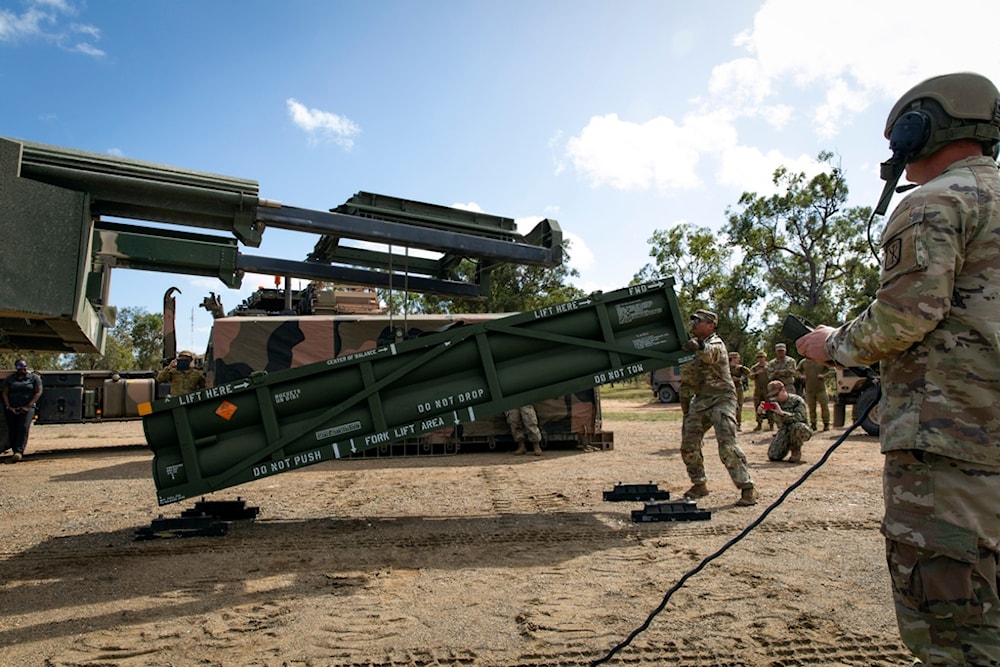Ukraine's ATACMS could fire back at US: National Interest
National Interest reports that the United States giving Ukraine the long-range ATACMS missile system might hurt Washington's interests.
-

A US Army Staff Sargent adjusts the Army Tactical Missile System (ATACMS) for loading on to the High Mobility Artillery Rocket System (HIMARS) at Williamson Airfield in Queensland, Australia, on July 26, 2023 (AP)
The US embassy in Kiev shut its doors on Wednesday, urging all staff to "shelter in place" in case of air raid sirens, amid concerns that Russia might target the building.
The closure follows President Joe Biden's controversial decision to authorize Ukraine's use of American long-range missiles, known as ATACMS, to strike targets deep within Russia.
Russia had previously warned the West for months that allowing Ukraine to launch US, British, and French missiles deep into Russian territory would lead Moscow to consider those NATO members as directly involved in the war in Ukraine.
In October, Russian President Vladimir Putin stated that Moscow would retaliate against Ukraine's use of US-made weapons to strike deep within Russian territory.
This move, viewed as a significant escalation in the ongoing conflict, has drawn sharp criticism from some experts and political analysts. Critics argue that the decision poses a direct risk to US national security and could expand the war, as per the National Interest.
Biden's authorization of ATACMS has raised alarms due to its potential to provoke a severe Russian response.
Russia had repeatedly warned that the introduction of Western long-range missiles into the conflict constituted a direct act of aggression that would necessitate a response. Reports suggest these weapons have already been used by Ukraine, prompting the US to evacuate its embassy as a precautionary measure.
According to National Interest, the timing of Biden's decision—just months before the end of his term—has baffled many. Analysts argue that the move offers no tangible military advantage for Ukraine, whose forces have faced significant challenges on the battlefield despite extensive Western support.
Military backing
Some retired US generals, including Jack Keane, Barry McCaffrey, and Wesley Clark, have backed Biden's decision, advocating for greater military aid to Ukraine. However, their stance has been met with skepticism, with critics pointing out their previous overly optimistic assessments of Ukraine's military prospects.
For instance, in September 2023, former general David Petraeus predicted a collapse of Russian defenses, even as Ukraine's summer offensive faltered. Analysts, including commentators in Responsible Statecraft, had already deemed the offensive a failure, advocating instead for negotiations to end the war.
Critics of Biden's strategy emphasize the need for a negotiated settlement, arguing that prolonged conflict only increases the human and financial toll on Ukraine and its allies. "The most prudent and moral course of action is to seek a settlement that preserves as much freedom and territory as possible for Kiev," one analyst noted.
Stark risks
The use of US-made long-range missiles risks pulling Washington directly into the conflict, the National Interest said. Critics warn that such escalation could provoke a broader war, jeopardizing American security and global stability. The decision also undermines the potential for a peaceful resolution, further straining US-Russia relations.
Biden's supporters are urged to reconsider his aggressive stance, emphasizing that safeguarding US interests should take precedence.
With Donald Trump campaigning on promises to end the Ukraine war, Biden's recent actions could complicate efforts for peace and have lasting geopolitical consequences.
Ukraine in trouble
As Russia intensifies its offensive in Kursk, US officials are increasingly concerned about Ukraine’s strained military, and Biden's policy shift may be motivated by fears that Trump will end US support for Ukraine.
Trump criticized Zelensky's relationship with the Biden administration, labeling him "the greatest salesman in history" for securing billions in aid from Biden's administration.
The US has been Ukraine's largest donor since the outbreak of the war in 2022, with Congress allocating tens of billions of dollars in military and humanitarian aid. Moscow has consistently condemned this support, arguing that it prolongs the conflict and will not alter the outcome.
While this decision enhances Ukraine's military capabilities, analysts suggest it is unlikely to be a game-changer due to the limited supply of ATACMS and their relatively short range compared to Russia’s vast geographical expanse.
The missiles, with a maximum range of 300 kilometers (190 miles), are expected to target high-value Russian military sites. Reports indicate that Russian airfields within range of these missiles have already relocated attack aircraft further inside Russian territory.

 4 Min Read
4 Min Read









